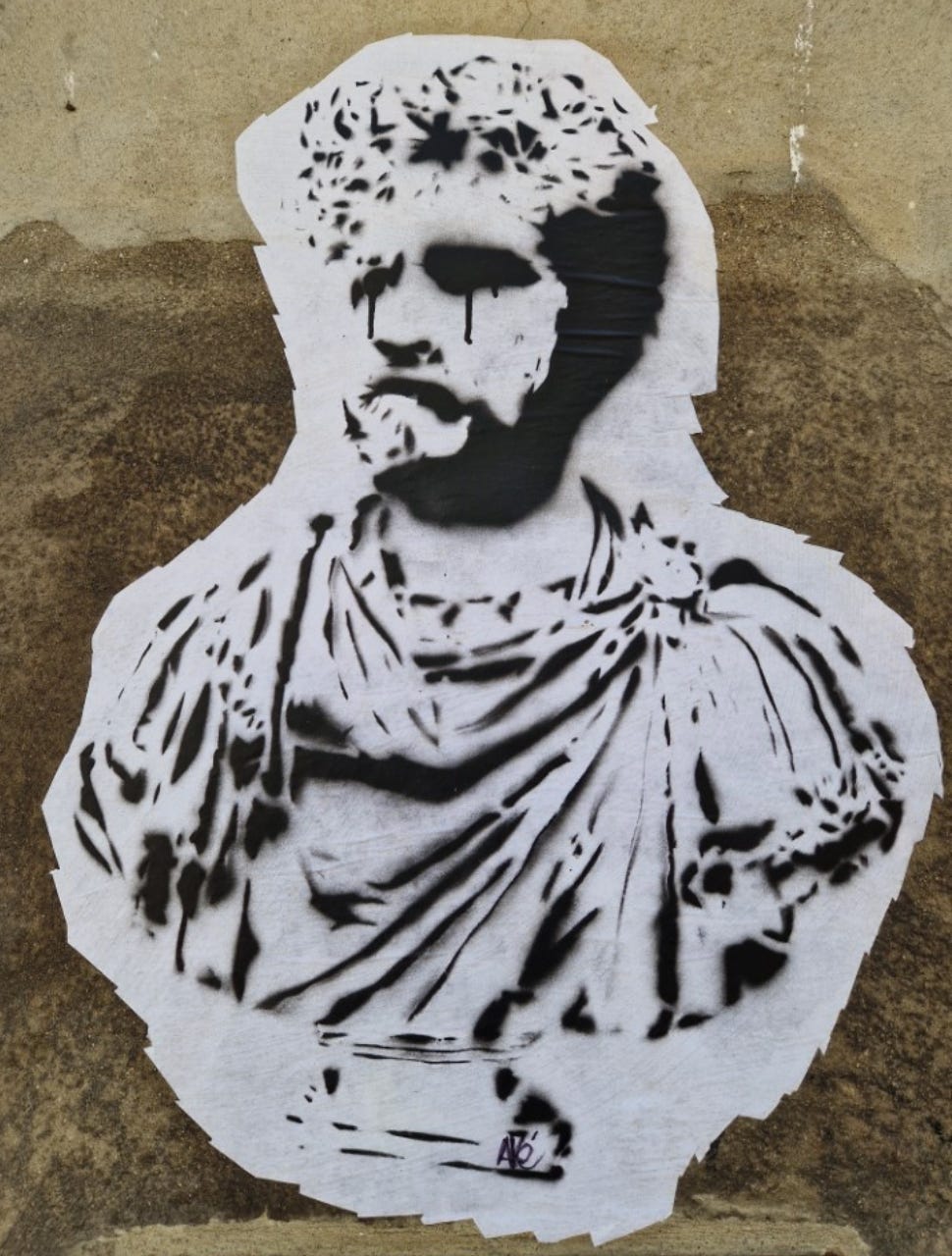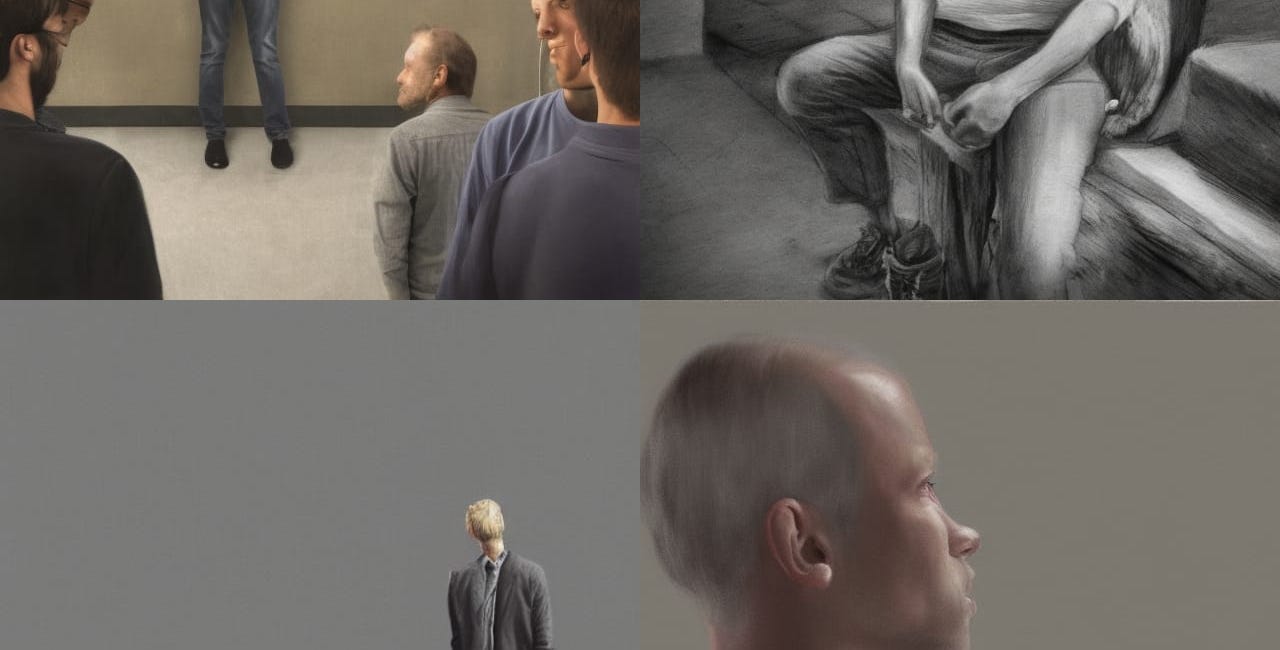The perils of identity
Resistance, in the end, has always been The Work
Sometimes an essay slots in with a satisfying click. Like this one.
If Rarely Certain was ever about anything it's conditions that optimise for steady state wellbeing.
Steady state wellbeing isn't happiness per se. It's the absence of leaning forward or back toward an alteration in situation.
To more reliably experience extended moments that could not be improved because you wouldn't want to change anything. No extra pleasure, no novel experience, no different condition or sensation.
Lots of self-help and psychobabble is about how to get something or reach somewhere. But this is more about absence of wanting.
The best Rarely Certain stab at explaining what this is like in practice was
That feeling when you get phasic bursting of dopamine neurons in the Ventral Tegmental Area
Things this piece talks about
Inevitably, when you explore questions of wellbeing, you eventually encounter the most famous Stoic principle which boils down to you are actually not really troubled by things in themselves - it's your own reaction to them that hurts (obviously Epictetus said it more elegantly).
Being an over-abstract thinker, most of the time I get that tip-of-the-tongue elusive word feeling when I try to nail down a personal telos. Or the sense of trying to remember an affective or impactful dream that won't quite reassemble from its leftover impressions.
I know what I'm thinking but I can't structure it clearly enough to share. It's that. Which is annoying.
So it's just as well that I read Justin Brown's piece about identities. He's done a better job of explaining why the early RC piece Belief As Identity is a keeper than perhaps I did when I wrote:
"The distinction between what you think and what you do seems to be conveniently forgotten in this time of moral hyper-vigilance. And I suspect that it leads to personal confusion around identity. I suspect that we find ourselves adopting beliefs, even if we don't externalise them as actions, because we mistake them as bits of us. Bits of identity."
--
There are two ways to be in this world; AS someone or as SOMEONE.
AS someone is to have a conscious identity. As SOMEONE is more amorphous. It's to be unconsciously you. To just exist as your own set of positive, negative and neutral qualities, thoughts, passions, likes and dislikes, without naming them as a construct.
Perhaps neither is best. But they're very different.
Having a conscious identity seems risky, due to the chances of dissonance arising. And also because of the potential for identities that are essentially unhealthy, either because you can't really live up to the identity you chose or because others won't recognise it.
Identities are risky because personas aren't really you. And so they become a mask. A way of hiding.
It was a sense of risk from 'outsourcing' who you think you are that prompted these old thoughts on the rarity and difficulty of individuation.
Who are we and how do we know?
"A human being, appearances to the contrary, doesn’t create his own purposes. These are imposed by the time he’s born into; he may serve them, he may rebel against them, but the object of his service or rebellion comes from the outside. To experience complete freedom in seeking his purposes he would have to be alone"
Enter Justin Brown and his idea of 'fluid integrity'.
The premise of his thinking could be a line from my old piece above. He says:
"you are not your beliefs—you are the awareness that chooses them, questions them, and when necessary, transcends them"
His demarcation between doing and being is one of those easily overlooked life insights that - once internalised - are disproportionately impactful.
This is because being is an identity and identities don't just need constructing and maintaining, they often need defending. The energy invested in projecting an image, both inwardly to yourself as well as out into the world, is a cost. Worse, an identity can be a carapace separating the real you from others - and an often brittle one at that.
An identity can be a way of avoiding vulnerability and projecting (perhaps faux) assuredness that's frequently moral but typically also status-seeking.
This is why people often bristle when confronted with the identity known as vegan.
--
A couple of years ago Yascha Mounk coined the term 'Identity Trap' in connection with the turn of leftishist politics into a kaleidoscope of intersectional categories of person, each infused with a differing value in the moral universe (autistic indigenous black migrant muslim transwoman representing the full house of intersectional bingo).
But identities are major currency outside of politics too. They even ended up being kind of formalised in business language, thanks to the invention of social media. This manifested as the concept of the 'personal brand'.
But less discussed is the impact of identity on the person themselves, especially when its fragile and needs bolstering.
Also from Brown’s piece
"I've been so miserable since starting CrossFit. I can't admit to my gym friends that I'm burned out because being 'the fitness guy' is all I have left."
"I've been calling myself a minimalist for three years, but I'm secretly drowning in anxiety about whether I own too much. I can't buy anything without feeling like I'm betraying who I am."
"I left my corporate job to become a 'conscious entrepreneur' and now I'm more trapped than ever. I can't pivot my failing business because everyone knows me as the guy who escaped the rat race. What happens to my identity if I go back?"
Brown's Instagram replies revealed what he calls "the hidden epidemic of our time: a generation of people who've confused temporary alignments with permanent essence, mistaking belief systems for identity itself."
We've all seen the reflexive dismissal of concerns about aspects of a particular group by someone who identifies with that group and how it seems to hurt them individually. Brown points out why this is, invoking the psychological concept of 'identity fusion' in which the boundary between the person and the group has dissolved.
He doesn't say this, but my sense is that adopting or retaining an identity is a safety move that can easily go wrong. It can lead to avoidance or loss of real self - necessitating performance, rather than authenticity. You seek the sense of value in your personhood that is necessarily inherent for eudaimonia by 'borrowing' it from elsewhere and hoping that others approve.
Brown again:
"When I met Brazilian shaman Rudá Iandê in 2014, he helped me understand something crucial: most suffering comes not from our circumstances, but from our rigid identification with temporary states. We think we need to be consistent, to have a solid sense of self. But what if that very solidity is what's strangling us?
Working with Rudá to help him launch programs like "Out of the Box"showed me that the people who suffer most are often the ones with the strongest moral convictions. They care so much about doing right that they lose touch with what actually serves their wellbeing. They become more committed to the purity of their positions than to the effectiveness of their choices.
This pattern isn't just creating individual misery—it's fracturing our collective ability to solve problems. When your identity depends on being "the environmentalist" or "the conservative" or "the progressive," you become psychologically invested in being right rather than getting things right. You can't adapt your strategies based on evidence because your strategies have become you.
Look at our political discourse. People can't change their minds about anything significant without feeling like they're committing intellectual suicide. Climate activists can't acknowledge when certain approaches aren't working. Business leaders can't pivot failing strategies. Parents can't adjust philosophies that aren't serving their families. We've lost the capacity for independent thinking because we've confused intellectual positions with personal essence."
Here's where I might be expected to signal personal liberation from identities.
That would be nice.
The one I'm stuck with was foisted onto me as a child. You don't need to know the details. The parents, bless them, thought it was best to be hyper-individualistic and never follow the crowd. I internalised these injunctions and by the time I questioned any of it, it was futile.
This identity is 'the outsider'.
As identities go, it's probably less risky than many. No one's going to think it's a performance, thereby threatening my concept of self. But it's not a particularly happy identity. It means having few genuinely close connections (mostly with other 'outsiders') and a constant sense of disconnection from the aspect of this world known as society.
It does invite judgement. Being temperamentally averse to normative currents can lead to being mis-labelled as a disciple of the opposite things. The most obvious example is resisting the hegemonic edifice of leftishist liberalism consolidated in every centre of influence, however 'illiberal' those temporarily in power at any given moment might appear. Outsiderness looks to the less curious observer like contumacy.
Really it's a function of resistance to team identification.
I suspect that had it not been for the socially-enforced speech/belief norm conformity among most midwits in response to the stream of new rules promoted by various rights groups from the late 90s until around 2020 I'd probably have had at least one girlfriend with a penis by now, just to make a point.
As a fully calcified outsider even the concept of 'loneliness' is unfamiliar. Being an emigré with no talent for languages reinforces outsideness which leads to endless frictions and a constant background hum of frustration.
But there's consolation. At least I didn't adopt one of those identities that make you feel better about yourself because they have high status in society. At least I don't have anyone pointing out inconsistencies and setting an impossibly high bar for my self-image to be accepted by others.
We're all familiar with the typical identities that people adopt. Things like the 'intellectual', the 'sceptic'*, the 'dissident', the 'artist', the 'rationalist', the 'helper', the 'stoic', the 'martyr', the 'philosopher' and they all sound exhausting to maintain - and even more tiring to defend from outside challenge.
Justin Brown's concept of 'fluid integrity' is a kind of permission to sometimes do the things that those identities entail, without becoming trapped in them - and then being marked for how well you're doing.
*[Amusingly, this blog is often identified by others as 'sceptical' and ranks in the philosophy charts of Substackistan. I'm sensing an identity being foisted on me again, when all I'm doing is noticing things, questioning and writing about them. This is not a philosophy blog. I studied philosophy long ago, at university. I’m not a philosopher. I don't understand most of the philosophy essays I try to read on this platform. But it's definitely a blog for people who are comfortable as outsiders and care little for what others think.]
Fortunately, as The Outsider, I'm able to touch stillness and slow my mind sufficiently to see this life for what it became. It sounds cheesy, but there's rarely even a frustrating day when I don't say out loud at some ordinary moment 'I love this life and how it's turned out', or (cringe) 'what a lovely day ... to be me' even though I have no money or prospects for getting laid.
Those are mantras adopted to explicitly celebrate what surfaced while I wasn't really looking or trying.
I'm glad to have avoided adopting a status-laden identity, even if I still ended up stuck with a lesser one.
I presume I'll always be The Outsider. I didn't choose it - it chose me and any remaining 'work' partly involves not intentionally living up to it by projecting outsiderness or clinging to it as a self-image.
There's a barbecue I'm organising for my hamlet neighbours. The timetable will be dread, as it approaches, endurance during and relief after. That's also constitutional introversion. But I can resist playing up to the image of the Outsider by momentarily bringing people together, with me on the inside.
The latest identity may be the costliest of all the maintain. It's the omnicause, now famously internalised by Greta Thunberg. The overhead seems to have manifested at the end of her stunt trying to breach Israel's naval blockade of Gaza on a yacht. During processing for deportation she looked away when officials projected footage of Hamas's videos celebrating their October 7 rape, torture, kidnap and murder spree.
I imagine the investment in self-regulating energy needed to manage the dissonance that this kind of performance must involve. To be a Queer For Palestine or a woman from a free western liberal state banging the drum for Islamist fundamentalists. The person forced to choose alignment with the one 'just' position vis a vis a complex set of socio-political trade-offs.
The epistemic tension and apparent logical inconsistency in those positions is presumably masked by investment in a symbolic identity that provides moral clarity, tribal belonging and externally-oriented emotional purpose.
But paradoxically Thunberg now seems diminished in some way rather than growing. Despite always being a target for the often bad faith derision of conservatives, she was in fact an interesting figure at one point. She almost single-handedly raised the philosophical question of our responsibility toward future generations (regardless of whether she was a cipher of her parents, which was always beside the point).
This shrinkage of stature is unsurprising when someone adopts an identity a mile wide and an inch deep. And it looks like hard work. I wouldn't swap places.
Identities are heavy, especially if you're choosing to carry the entire team that represents your category of person, or performing what's expected of your class of human.
But, as Justin Brown says
"When you hold your identities lightly, you can respond to life as it unfolds rather than defending against it. You can be wrong without being worthless. You can change without losing yourself."
Which seems wiser to me.
If you buy me a ̶c̶o̶f̶f̶e̶e̶ nice beer you get paying subscriber rights for a month. More than one beer, more than one month. It can be cheaper than subscribing through Substack if you visit the page to see the longer-term support offer.




